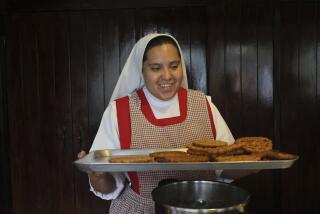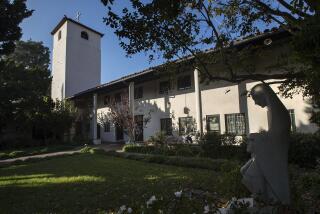Monks Give Us This Day Our Daily Bread : Religion: Even Holy Week doesn’t stop busy bakers of Abbey of the Genesee. Their income supports the Cistercian monastery and others in Africa and Latin America.
PIFFARD, N.Y. — It is still dark outside as Brother Patrick takes his place at the end of the production line. Already, he’s been up for three hours.
With Vigils at 2:25 a.m., he and his fellow Cistercian monks resume a tireless cycle of prayers. But three mornings a week, they leave the shadowy stillness of their cloisters and go to work in a clamorous bakery down the hall. Even Holy Week--the week leading up to Easter--doesn’t stop the busy bakers of the Abbey of the Genesee.
Packing the sunflower-and-bran loaves into plastic bags, Brother Patrick quickly establishes a soothing rhythm.
“A good day is when there’s no holes in the bags, the tags are all intact and almost every loaf can be put in the basket. Then it’s not difficult for me to pray,” he said.
On a more troublesome shift, he added with a smile, “you just have to work at it.”
“The work is meant to fit in with a life of prayer,” even at times when the Scriptures alter the monastic tempo, said Brother Patrick, 52, a New York City native who entered the abbey out of high school.
During Holy Week, less important tasks like Brother Patrick’s seminars on the 12th-Century writings of early Cistercian tradition are set aside to concentrate even more on worship. “There’s a certain solemnity to the liturgy and that kind of creates a tone for the whole week,” he said.
But the baking doesn’t cease. There are loyal customers to keep in Buffalo, Rochester and Syracuse, and 50,000-plus white, whole wheat, raisin and sunflower-bran loaves to churn out each week.
For centuries, monasteries have relied on tasks such as farming, raising animals or copying manuscripts. Nowadays, they’re likely to have switched to a cottage industry, making wine, cheese, candles or perfume.
Monks’ Bread, begun soon after the Abbey of the Genesee was founded near this western New York village in 1951, has proved a lucrative niche.
The 40 or so monks and priests make enough profit from more than $2 million in annual sales to support their monastery and others in Africa and Latin America as well.
In accordance with their vow of poverty, however, their purpose is to earn only as much as will sustain the Roman Catholic order’s worldly needs and allow them to hurry back to their calling.
“The spiritual goals are paramount,” said Brother Augustine. “If we wanted to underprice everybody we could, but we don’t do that. We are consciously staying home-based and not expanding.”
The monks need not, and hardly ever do, venture off their 2,500 acres of woods and gently rolling farmland in the Genesee Valley. The bakery manager and the distributors are laymen; the monks do the in-house grunt work, in three 2 1/2-hour shifts.
“The bakery’s pretty noisy, so all hell breaks loose for 2 1/2 hours,” said Brother Gerard, laughing softly. “It gives you a chance to limber up. Physically, it complements.”
The 37-year-old monk from Bombay, India, arrived at the abbey in 1992 after training for the priesthood and working in his father’s electrical shop.
On Palm Sunday, in a ceremony called the simple profession, he vowed to live the Cistercian life for up to three more years. After that comes the solemn profession, a lifetime commitment.
“My parents accept it but they don’t understand it,” he said.
“We come from a 1,000-year tradition. That sort of gives you a little more confidence that, you know, you’re not the only guy seemingly wasting your time.
“Except for charity and hospitality we provide in the abbey, we’re not engaged in the work of the apostle. It’s a supernatural value. By searching for God wholeheartedly in our community, in some way the world is being benefited, but not tangibly. You can’t see it.”
Whenever he has doubts, he finds solace in the Lord’s Prayer.
“ ‘Give us this day our daily bread’--that’s what Jesus said. Look to today, do not worry, the Heavenly Father will provide.”
More to Read
Eat your way across L.A.
Get our weekly Tasting Notes newsletter for reviews, news and more.
You may occasionally receive promotional content from the Los Angeles Times.










